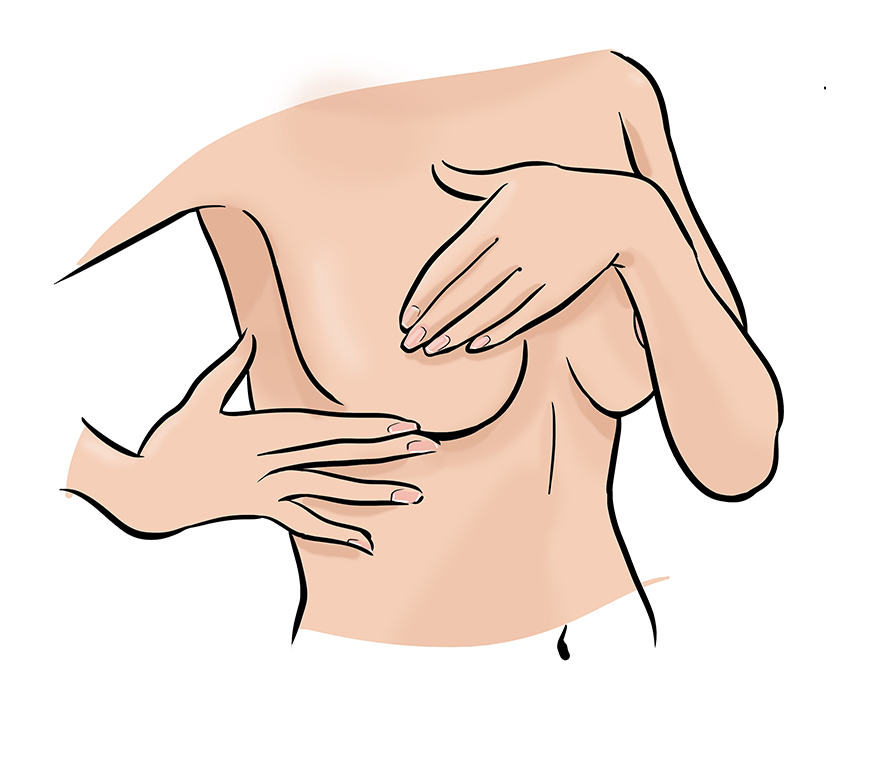Capsule fibrosis after a breast operation
After getting a breast implant, some women suddenly feel a very hard spot in their breast. Depending on the severity, this hardness can cause severe tension pains.
The diagnosis is then often capsule fibrosis. When this fibrous tissue hardening occurs after a breast operation, how to recognize it and when it must be treated, you can read on the following pages.
Contents
What is capsule fibrosis?
After the insertion of a breast implant, for example as part of a breast enlargement, it may occur that a collagen-rich capsule of hard, body-own tissue forms around the implant and thus encapsulates the implant from the rest of the tissue. This is neither unnatural nor worrying, because this is simply a normal defense reaction of the body, which protects the rest from foreign body.
Pictures capsule fibrosis

Development of capsule fibrosis in the breast
The formation of a tissue capsule around a foreign object is normal. As long as this tissue is soft and stretchy, it usually does not cause pain or can be felt.
It only becomes painful when it goes through the first of the various stages.
- Initially, the thickening process of the tissue capsule around the implant takes place unnoticed. No hard knot can be felt yet, and there are no tension pains or touch sensitivity.
- The more the tissue capsule thickens and compacts, the better it can now be felt. Light tension pain and increased touch sensitivity set in - the first overt symptoms of capsular fibrosis in the breast after implant placement.
- The thicker the tissue capsule becomes and the tighter it surrounds the implant, the more palpable the hardness becomes, and the greater the tension pain and touch sensitivity will be.
- The final stage of capsular fibrosis in the breast is expressed through persistent severe tension pain. The strong and permanent pressure on the breast implants causes them to deform.
Capsule fibrosis- which treatment when?
If patients experience tension pain and increased sensitivity in their breasts, they should always have a check-up, especially when signs of breast capsule fibrosis appear. This can be done by ultrasound or by having the breasts examined by a surgeon.
For mild pain, massages can help relieve the symptoms. Repeated ultrasound is also used in the treatment of non-advanced capsule fibrosis after breast surgery.
If the pain is severe, an endoscopic, minimally invasive fibrosis incision may be promising as a treatment. In this procedure, the surgeon cuts through the hardened tissue capsule at one or multiple points. This reduces the tension and pressure on the implant, allowing the implant to have more space.
Depending on the extent of the hardness and, at the latest, when the breast is deformed, it may eventually be necessary to replace the breast implant.
How to prevent capsule fibrosis
Unfortunately, it is not possible to completely exclude the occurrence of tissue hardening in the breast after inserting one or two implants. However, the risks can be significantly reduced by choosing the implants and by the surgical procedure itself.
This includes sterile, non-contact, and gentler surgical techniques that avoid unnecessary tissue injury, reduce bleeding during breast surgery, and thus lower the thresholds for bacteria that can lead to infections.
It can also be preventive to place the new implant behind the muscle instead of on top of it (submuscular), at least in the case of an implant replacement after capsule fibrosis.
In some cases, it may also help to use smooth breast implants instead of textured ones.
Is capsule fabrosis after breast surgery one-time only?
No, unfortunately not. The risk of capsular contracture recurring even after the implant has been replaced or after other treatments still exists. However, the risk decreases as the measures mentioned above are implemented more precisely.
Is it possible to insure against the costs of capsule fibrosis?
Just then, if due to advanced capsular fibrosis only a change of the implant can provide relief, corresponding costs can arise for this follow-up treatment of breast enlargement.
To avoid having to bear these costs completely or at least not completely, it is worth comparing appropriate supplementary insurance that covers the costs resulting from aesthetic-cosmetic treatments.
Treatment of capsule fibrosis in Munich
Schedule your personal consultation appointment today in my modern practice in Munich for Plastic and Aesthetic Surgery. As a skilled surgeon with long-standing experience, I am always happy to assist you with action, advice, and comprehensive expertise.
Leading plastic and aesthetic surgeon
Over 6000 surgeries - Experience from practice & further education

During a personal appointment, I will advise you completely individually. Make the most of your type. I am looking forward to seeing you!
DR MED CHRISTIAN LENZ IS KNOWN FROM







